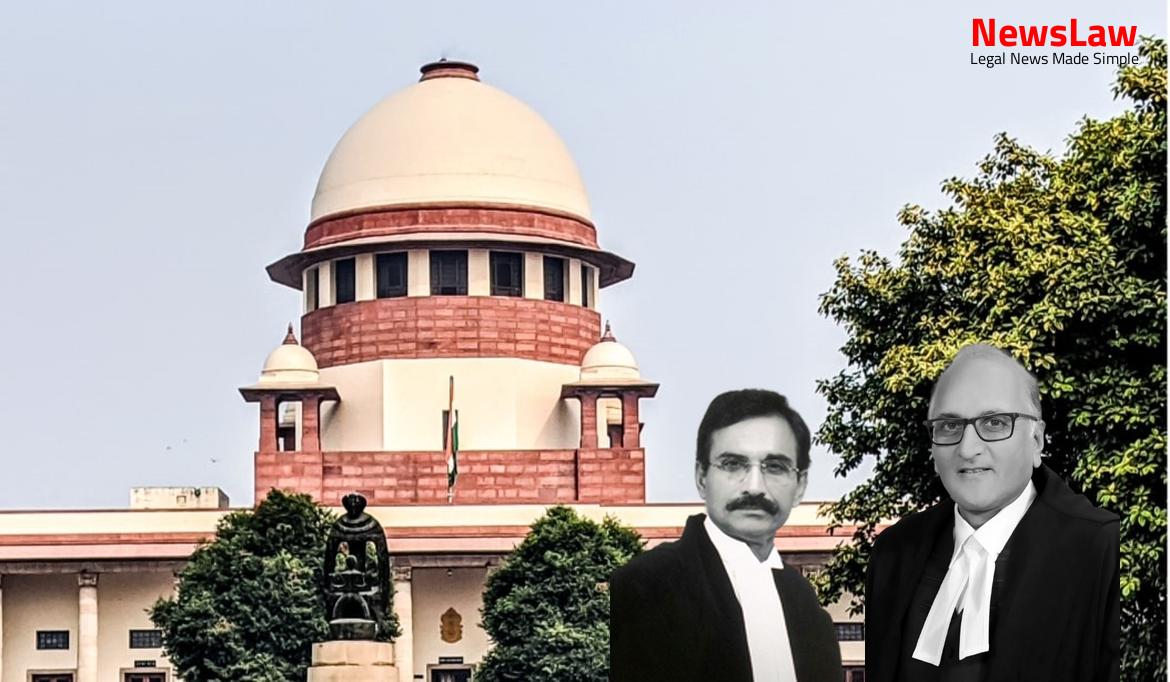Explore the in-depth legal evaluation conducted by the Labour Court in a recent case concerning transfer orders under the Industrial Disputes Act. The court’s meticulous examination of the circumstances surrounding the transfers provides crucial insights into employee protections and compliance with labor laws. Stay tuned to unravel the complexities of this significant legal analysis.
Facts
- The employer denied adopting any unfair labor practices and argued that compliance with Section 9A of the I.D. Act was not necessary due to the continuous reduction in production at Dewas and the surplus staff.
- The employer claimed that the transfer of the workmen was to accommodate the surplus staff based on their service conditions, and no notice under Section 9A of the I.D. Act was required.
- The employer mentioned that Chopanki factory had all the necessary facilities.
- The High Court of Madhya Pradesh dismissed the petitions by the employer and upheld the Labour Court’s decision declaring the transfer of the workmen as illegal and void.
- The workmen alleged that the transfer was done with malafide intent to reduce staff at Dewas and that they were pressured to resign.
- The workmen argued that the transfer to Chopanki, 900 Kms away, was unjustified as their family resided in Dewas, and Chopanki lacked essential facilities.
- The workmen also contended that the nature of work at Dewas and Chopanki was different, making the transfer illegal.
- The Labour Court considered the statements of the employer and workmen before making its decision.
- The Labour Court found that the transfer of the workmen would change the nature of their work, as they would be working as Supervisors at Chopanki instead of labourers at Dewas.
- Both parties presented evidence and documentary evidence to support their cases.
- The Labour Court determined that the employer failed to prove continuous reduction of production at Dewas and staff surplus.
- The High Court dismissed the writ petitions under Article 227 filed by the management, which led to a writ appeal before the Division Bench that was also dismissed.
- The management appealed the decision, challenging the Labour Court’s declaration of the transfer orders as illegal and in violation of Section 9A of the I.D. Act.
- The Labour Court concluded that the transfer of nine workmen from Dewas was aimed at reducing the workforce at Dewas without proper notice, rendering the transfer orders null and void.
- As a result, the Labour Court set aside the transfer orders.
Also Read: Legal Analysis on Conviction Based on Sole Testimony of Prosecutrix
Issue
- The issue referred to the Labour Court was regarding the validity and propriety of the transfer of Shri Kanhaiyalal by the Non-Applicant.
- The workmen through their Union raised this industrial dispute before the competent authority.
- Conciliation proceedings failed, leading to a reference to the Labour Court for resolution.
Also Read: Legal Analysis on Concurrent Sentences in Drug Trafficking Cases
Arguments
- The appellant’s argument revolves around the nature of jurisdiction invoked and the relief sought to determine whether the petition is under Article 226 or Article 227 of the Constitution.
- The employer argues that the transfer was to assign workmen as supervisors after training, suggesting a change in their employment status.
- The workmen counter that the transfers were a means to effectively retrench them without following legal procedures.
- Both the Labour Court and the High Court found the workmen to be covered under the Industrial Disputes Act, providing them protection.
- The employer challenges the findings that the transfer orders were illegal and in violation of the Industrial Disputes Act.
- The workmen argue that the transfers, especially given the distance and lack of facilities, were a form of victimization forcing them to leave their jobs.
- The dispute also involves the jurisdiction under which the petitions were filed, with contentions over whether they were correctly categorized under Article 226 or Article 227.
- The situation at hand is deemed crucial as it potentially impacts the workmen’s service conditions and their rights under the law.
- Various legal precedents and judgments are cited by both parties to support their respective arguments.
- Appellant claimed writ petition was under Article 226, but the cause title stated it was under Article 227.
- Appellant cannot now argue the petition was under Article 226 for writ appeal.
- Both Single Judge and Division Bench correctly determined petition was under Article 227.
- Respondent employees have not been paid salaries since transfer order of 13.01.2015.
Also Read: Legal Jurisdiction and Award Finality in Arbitration Dispute
Analysis
- The transferred employees were ‘workmen’ as defined in the Industrial Disputes Act, entitled to protection under its provisions.
- The transfer from Dewas to Chopanki would change the nature of work and service conditions for the employees.
- The transfer resulted in a reduction of employees at Dewas factory, attracting Section 9A of Industrial Disputes Act and Fourth Schedule.
- Concurrent findings by Labour Court and Single Judge deemed the transfer arbitrary, mala fide, and violative of Section 9A.
- The transferred employees were to work as supervisors at Chopanki, leading to deprivation of benefits under the Industrial Disputes Act.
- The transfer affected the employees at the fag end of their service career, with adverse living and working conditions at Chopanki.
- The change in status from ‘workman’ to ‘supervisor’ due to transfer altered their service conditions and rights under the Industrial Disputes Act.
- The findings by Labour Court and Single Judge extensively analyzed the evidence and circumstances of the case.
- Employers intending to make changes in the conditions of service for workmen must provide notice to the affected workmen.
- The notice must detail the nature of the proposed changes.
- Changes cannot be implemented within twenty-one days of providing the notice.
- Exceptions to providing notice include changes made in accordance with settlements or awards, or for workmen covered under specific rules and regulations.
- The Fourth Schedule specifies the conditions of service for which notice must be given.
- These conditions include wages, contributions to funds, allowances, hours of work, leave and holidays, shift working, classification by grades, rules of discipline, plant improvement likely to lead to retrenchment, changes in employment numbers, among others.
- The prayer is to quash and set aside the judgment and award passed by the Labour Court.
- The Division Bench dismissed the writ appeal as not maintainable.
- Even if the petition was treated as under Article 226, the writ appeal would have been maintainable.
- Due to the length of time since the order of transfer in 2015 and retirement of many employees, the controversy was decided on merits.
- No interference was found necessary with the judgment and award of the Labour Court confirmed by the Single Judge.
Decision
- Transfer order dated 13.01.2015 was deemed illegal and mala fide.
- Decision made on the issues at hand based on merits.
- All appeals are to be dismissed.
- Workmen entitled to consequential benefits, including arrears of salary etc., as if they were not transferred.
- Benefits such as arrears of salary/wages, retirement benefits to be paid within four weeks.
- Costs set at Rs. 25,000/- per workman to be paid within four weeks.
- Appellant directed to comply with judgment and award.
Case Title: CAPARO ENGINEERING INDIA LTD. Vs. UMMED SINGH LODHI (2021 INSC 676)
Case Number: C.A. No.-005829-005830 / 2021



